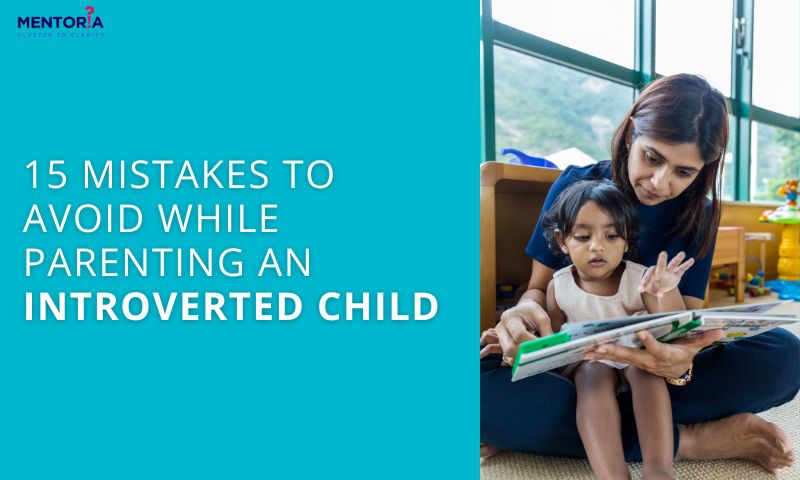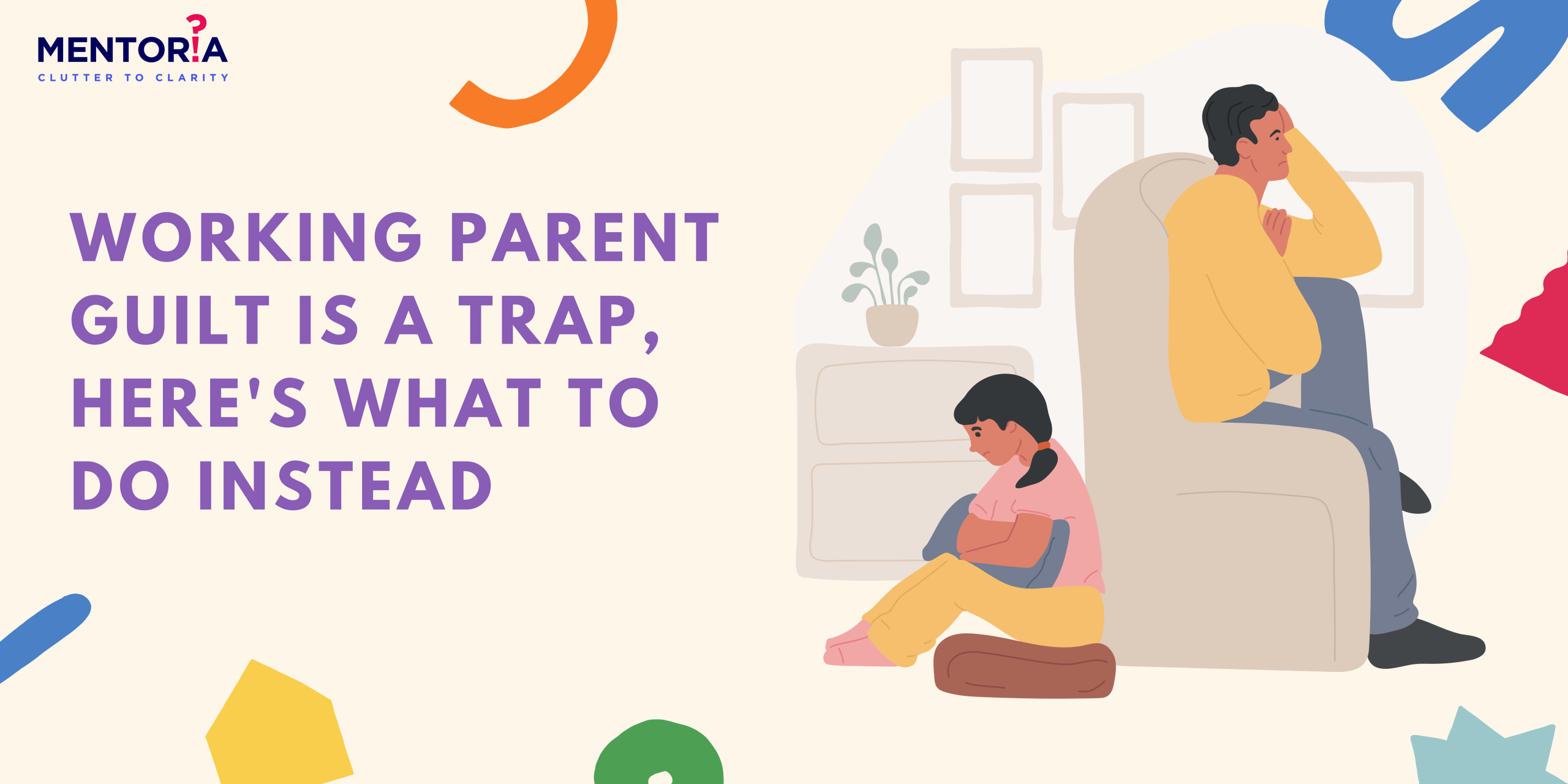15 Mistakes to Avoid While Parenting an Introverted Child

Jump to Section
Parenting is a rewarding yet challenging journey, and when you have an introverted child, the adventure takes a unique twist. Introverted children have distinct needs and characteristics that require a different parenting approach compared to their extroverted counterparts. In the hustle and bustle of today’s society, it’s common to make mistakes when raising introverted kids. However, understanding and accommodating their personalities can lead to a more harmonious and fulfilling family life.
In this blog, we will explore 15 common pitfalls to avoid when parenting an introverted child. From respecting their need for solitude to embracing their deep thoughts and passions, you’ll discover practical tips and a more relaxed way to navigate the parenting journey with your introverted child. Celebrate their unique qualities and help them thrive while nurturing their confidence and happiness. By avoiding these pitfalls and embracing their introversion, you can create a nurturing environment that allows your child to shine as the wonderful individual they are.
Pushing Them to Be More Outgoing
One of the most common mistakes parents make when raising introverted children is pushing them to be more outgoing. It’s natural to want the best for your child and to expose them to a wide range of experiences, but it’s essential to remember that introverted children are wired differently. They gain their energy from alone time and tend to feel drained in overly social situations. Forcing them to be more outgoing can lead to discomfort, stress, and even long-term emotional scars. It’s important to respect your child’s natural temperament and not try to change them into someone they’re not. Instead, focus on helping them develop the social skills they need while honouring their need for solitude and reflection.
Introverted children have a deep need for solitude, and as a parent, it’s crucial not to overlook or dismiss this fundamental aspect of their personality. While extroverted children might gain energy from social interactions, introverts find their strength in quiet moments of reflection and alone time. It is a common mistake to misinterpret their desire for solitude as antisocial behaviour or withdrawal. In reality, this time alone is where they recharge and process their thoughts and feelings. It’s an integral part of their emotional and mental well-being.
To support your introverted child, acknowledge and respect their need for solitude. By incorporating quiet time into your child’s daily routine, you provide them with a period of uninterrupted alone time, whether it’s after school or before bedtime. Consistency in this routine helps them anticipate and appreciate these moments of solitude. It’s crucial to pay attention to your child’s non-verbal cues and respect their signals when they seem withdrawn or in need of space. Give them the freedom to step back without pressuring them to engage in social activities. While it’s important to respect their need for solitude, it’s also beneficial for introverted children to develop social skills. Plan social interactions, but ensure there’s a balance. Let your child choose the timing and setting that makes them most comfortable. Engage in open conversations with your child about their introversion, discussing and validating their feelings. Let them express their thoughts and ensure they know that their need for solitude is perfectly normal and healthy. If you have other family members who may not fully understand introversion, take the time to educate them about the nature of introverted personalities. This can help create a more supportive and empathetic family environment.
Comparing Them to Extroverted Siblings
A parenting mistake to avoid when raising an introverted child is comparing them to their extroverted siblings. It’s essential to remember that each child is a unique individual with their own set of strengths and challenges. Comparing them to their siblings, especially if they happen to be extroverted, can be damaging and create feelings of inadequacy and resentment. Introverted and extroverted children have different personalities, needs, and ways of engaging with the world. Comparing them can inadvertently send the message that one child’s traits are superior to the other’s, which is neither fair nor accurate. Instead, celebrate the individuality of each child. Recognise and appreciate their unique qualities and talents. Encourage their strengths and help them overcome their challenges in a supportive and understanding way. By doing so, you foster a positive self-image and a healthy sibling relationship where both children feel loved and valued for who they are.
Overloading Their Schedule
While extracurricular activities can be enriching and offer valuable experiences, introverted children can become overwhelmed when their schedules are packed with back-to-back activities. This overload can lead to stress, exhaustion, and a decreased ability to focus on their interests. Instead, consider a balanced approach. Allow your child to choose activities that genuinely interest them and align with their passions. Quality should take precedence over quantity. It’s better to have a few activities that they can fully engage with and enjoy, rather than a hectic schedule that leaves them feeling drained and pressured. Pay attention to signs of stress or burnout, and be open to adjusting their schedule as needed
Interrupting Their Deep Thoughts and Forcing Social Situations
Introverted children often engage in deep, thoughtful reflection, and one mistake to avoid is constantly interrupting their inner world. While it’s essential to encourage open communication, it’s equally important to respect their need for uninterrupted contemplation. When your introverted child is engrossed in thought or a creative activity, try not to disrupt them with constant questions or demands for attention. Give them the space to explore their ideas and feelings at their own pace. Later, when they’re ready, they may be more inclined to share their insights or discuss their thoughts with you. This approach fosters a sense of trust and allows them to develop their ideas and sense of self without feeling pressured or rushed.
Introverted children tend to thrive in quieter, smaller social settings. One common mistake to avoid is forcing them into overwhelming or overly stimulating social situations. While it’s essential for them to develop social skills and feel comfortable around others, it’s equally crucial to do this at a pace that suits their temperament. Rather than pressuring them into large, boisterous gatherings, focus on gradually introducing them to more intimate social interactions. Encourage one-on-one playdates or smaller group activities with close friends or family members. This allows them to build their social confidence in a more comfortable setting. Avoid pushing them into situations that might make them anxious or uncomfortable, as this can lead to feelings of inadequacy or a dislike of social interactions.
Not Listening Actively
Introverted children often express themselves through thoughtful conversation, and a mistake to avoid is not actively listening to what they’re saying. It’s easy to get caught up in the fast pace of life and not give them the attention they need and deserve. When your introverted child opens up and shares their thoughts, take the time to truly listen. Engage in meaningful conversations, ask questions, and encourage them to express themselves fully. Avoid rushing them or dismissing their ideas as irrelevant. Active listening not only helps them feel valued and heard but also deepens your connection and understanding of their unique perspective.
Another common misconception is assuming that introverted children are shy and lack confidence. Introversion is not synonymous with shyness or low self-esteem. Introverted kids can be just as self-assured and capable as their extroverted counterparts, but they may express their confidence in different ways. Avoid making assumptions about your child’s confidence based on their introverted nature. Instead, celebrate their strengths, such as their ability to think deeply and their capacity for self-reflection. Encourage them to develop self-assuredness by acknowledging their accomplishments and providing positive reinforcement. Recognise that their confidence may shine through in quieter, more subtle ways, such as excelling in their passions or offering valuable insights in meaningful discussions.
Labelling Them as ‘Too Serious’ and Setting Unrealistic Expectations
Introverted children are often perceived as ‘too serious,’ and this is a common mistake to avoid. Just because they may not engage in frivolous banter or constantly seek attention doesn’t mean they lack a sense of fun or humour. Introverted kids have a rich inner world and often appreciate the beauty of subtlety and nuance. Avoid labelling them as ‘too serious’ and instead, embrace their thoughtfulness and their ability to focus on important matters. They may express their sense of humour in quieter ways, such as through witty observations or clever wordplay. Encourage and celebrate their unique brand of humour and joy, which might be more understated but is no less valuable.
Introverted children may have different social and academic needs compared to their extroverted peers, and it’s a mistake to set unrealistic expectations for them. Avoid imposing unrealistic goals or comparing their progress to that of more extroverted children. Instead, focus on helping them develop their strengths and work on their challenges at their own pace. Recognise their individuality and provide guidance and support tailored to their needs. Encourage them to express themselves in ways that feel authentic and comfortable to them. By doing so, you’ll help them build self-confidence and a sense of achievement based on their unique abilities.
Overlooking Their Passions
Introverted children often have deep interests and hobbies that are a significant part of their lives. One mistake to avoid is overlooking these passions. Instead, support and nurture these interests as they can be a source of immense joy and personal growth for your child. Take the time to learn about their hobbies and encourage their exploration of these interests. Provide the necessary resources and opportunities for them to develop their skills and knowledge in their chosen fields.
Dismissing Their Feedback and Not Encouraging Communication
Introverted children may not always readily share their thoughts and feelings, so dismissing their feedback is a mistake to avoid. When they do express their preferences or concerns, take them seriously. Listen to what they have to say, and acknowledge the validity of their input. Avoid brushing off their thoughts or feelings as unimportant. By valuing their feedback, you demonstrate that their opinions matter and encourage them to continue sharing. Open and honest communication is essential for their emotional well-being and the development of a strong parent-child relationship.
Introverted children might be less inclined to initiate conversations, so it’s essential to actively encourage communication. Create an open and welcoming atmosphere in your home where they feel comfortable sharing their thoughts and emotions. Initiate conversations with them, ask open-ended questions, and express your genuine interest in their experiences. Be patient and provide opportunities for them to talk about their day or their feelings. By fostering a culture of communication, you make it easier for them to express themselves and seek your guidance or support when needed.
Ignoring Their Non-Verbal Cues
Introverted children may not always use words to express themselves, and their non-verbal cues can be a valuable window into their emotions. One mistake to avoid is ignoring these non-verbal signals. Pay attention to their body language, facial expressions, and gestures. These non-verbal cues can provide insights into their feelings, even when they’re not verbally expressing them. By acknowledging and responding to their non-verbal communication, you show that you’re attuned to their needs and emotions.
Not Celebrating Small Wins
Introverted children may not always seek the spotlight, but their achievements, no matter how small, should not go unnoticed. A mistake to avoid is not celebrating these small wins. Recognise and celebrate their accomplishments, whether it’s completing a challenging school project, making a new friend, or achieving a personal goal. By acknowledging their efforts and successes, you boost their self-esteem and motivate them to continue striving for excellence. Celebrating these moments also helps build their self-confidence and reinforces the idea that their contributions are valuable and worthy of recognition.
Parenting an introverted child comes with its unique set of challenges and joys. Avoiding common mistakes like pushing them to be more outgoing, overlooking their passions, or dismissing their feedback can help create a supportive and nurturing environment where your child can thrive. By understanding and celebrating their introverted nature, encouraging open communication, and respecting their need for solitude and deep thought, you’re not only helping them grow but also fostering a strong parent-child relationship built on trust and appreciation. Embrace your introverted child’s individuality and watch them flourish in their own unique way.
Labelling Them as Shy
The label “shy” can create misconceptions about an introverted child’s personality. It’s important to avoid generalisations, as shyness doesn’t necessarily mean discomfort or hesitancy in social situations. Instead, introverted individuals often prefer solitary activities to recharge, which doesn’t necessarily mean they are shy. Labelling a child as “shy” can limit their self-perception, encouraging a negative self-image and affecting their confidence. It’s also important to recognise that an introverted child might possess other traits, such as creativity, analytical thinking, and deep empathy, which can be overshadowed by the label. Additionally, it’s crucial to underestimate their abilities, as they might surprise others by being more outgoing when comfortable. Instead of using the term “shy,” it’s more beneficial to understand and appreciate an introverted child’s unique qualities. Emphasising their strengths, creating an environment where they feel accepted, and providing opportunities for growth without pushing them out of their comfort zone can help them thrive while embracing their introversion positively.
Disregarding Their Input
Ah, overlooking the input of an introverted child is like missing out on a treasure trove of insightful perspectives! These kids often have a wealth of thoughts and ideas brewing beneath the surface, ready to be shared when they feel comfortable.
Your introverted child might not always be the loudest voice in the room, but their quiet contemplation often leads to profound insights. By disregarding their input, we could be missing innovative solutions, creative suggestions, or a fresh take on things that others might not have considered. Imagine the pride and confidence they’ll feel when their thoughts are acknowledged and valued. It’s like giving them a megaphone to share their unique viewpoint with the world. Their input might just be the missing piece to a puzzle or the spark that ignites a fantastic idea.
So, make sure to create spaces where they feel safe to express themselves without pressure. When we actively seek and consider their input, we’re not just empowering them; we’re enriching conversations, broadening perspectives, and nurturing their self-assurance in their abilities.
Not Advocating for Them
Not advocating for introverted children can feel like leaving them adrift in a sea of misunderstanding. These kids often have specific needs that, when unaddressed, might make them feel overwhelmed or overlooked in various situations.
Imagine being their advocate—a guiding lighthouse amidst unfamiliar waters. Advocating for introverted children means ensuring their preferences, comfort, and unique strengths are understood and respected. It’s about stepping in when needed to make sure they’re not pushed beyond their limits or overlooked in group settings. When we advocate for introverted children, we’re essentially championing their right to be themselves. It’s like standing beside them, reassuring them that it’s okay to take their time, to prefer quiet spaces, and to contribute in their own thoughtful way.
By speaking up for them in social or academic settings, we’re ensuring that their needs are acknowledged and accommodated. It’s not about shielding them from challenges, but about making sure they have the support and understanding they require to navigate these situations comfortably. Being their advocate isn’t just about being a voice for them; it’s about empowering them to find their voice, encouraging others to appreciate their unique qualities, and ensuring they have the opportunity to shine in environments that might otherwise overlook their strengths.
Assuming They’re Unhappy
Assuming an introverted child is unhappy just because they prefer quiet moments over constant chatter is a bit like mistaking a serene lake for a stormy sea. Introverted kids often find solace and contentment in their inner world, and their peaceful demeanour doesn’t necessarily signal unhappiness.
Imagine their inner world as a cosy haven—a place where they find joy in solitary activities, contemplation, and introspection. Sometimes, their happiness doesn’t come with loud laughter or exuberant expressions but is reflected in their calm and thoughtful demeanour.
When we assume they’re unhappy simply because they’re not the life of the party, we might miss out on witnessing their unique form of happiness. By understanding and respecting their need for quiet moments, we allow them the space to find their own version of contentment.
Instead of assuming, engage with them in ways that make them feel understood and appreciated. create an environment where they can freely express their emotions without feeling pressured to conform to extroverted standards of happiness. In doing so, we honour and embrace their individuality, allowing them to flourish in their own tranquil way.
Pressuring Them to ‘Open Up’
Encouraging an introverted child to “open up” can sometimes feel like trying to coax a flower to bloom before it’s ready. These children often prefer to process their thoughts internally and may take their time to share their feelings or experiences. Think of it this way: their inner world is like a garden, and their thoughts and emotions are delicate petals that unfold gradually. Rushing this process might make them feel uncomfortable or hesitant to share, hindering the natural growth of their self-expression. Instead of pressuring them to open up, cultivate an environment of trust and understanding. By showing genuine interest in their thoughts and feelings without imposing deadlines, give them the nurturing space they need to feel comfortable sharing at their own pace.
Imagine the beauty when they feel supported and valued, allowing their thoughts to blossom naturally. When they feel secure and less pressured, they may surprise us with the depth and richness of their insights and emotions. So, be patient gardeners, tending to their emotional landscape with care, creating an environment where they feel safe to open up when they’re ready. In doing so, we foster a sense of trust and connection that encourages them to share their inner world in their own beautiful time.
Nursing Potential Through Mentoria
Nurturing the unique potential of an introverted child is an important investment in their future. By helping them to develop their strengths and talents, you can help them to live a happy and fulfilling life. Mentoria can help introverted children to set realistic and achievable goals, and to develop a plan for achieving them. This can be especially helpful for introverted children, who may need more support in this area. We also provide children with a safe space to explore their interests, strengths, and weaknesses. They can learn to accept themselves for who they are, including their introversion.








